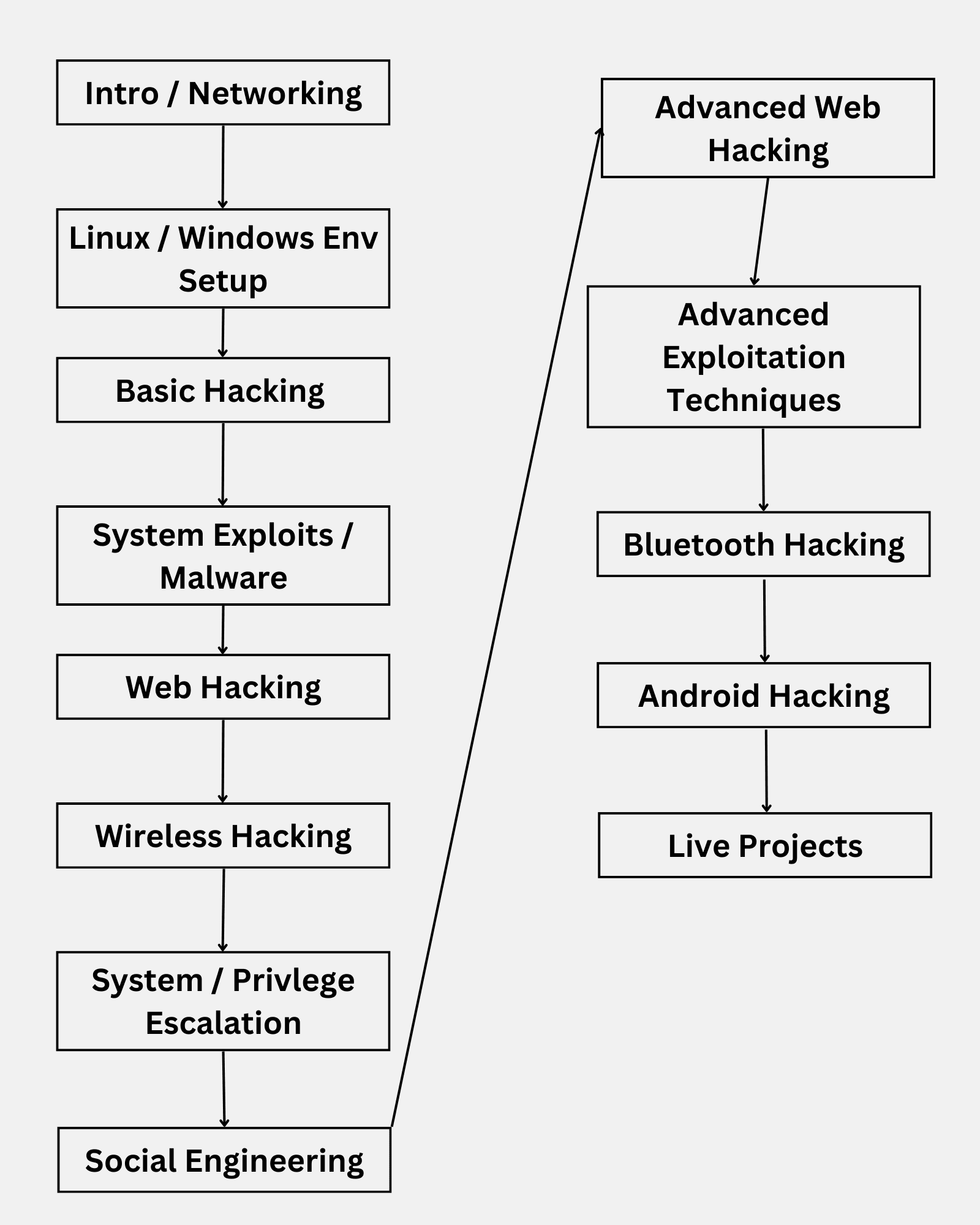Ethical Hacking Course in Jalandhar
Become a cybersecurity expert: Join our Ethical Hacking Course in Jalandhar today!
Ethical Hacking Course in Jalandhar – Become a Certified Ethical Hacker with WebDox Computer Institute! 🛡️💻🚀
At Webdox Computer Institute, our Ethical Hacking Course in Jalandhar addresses the growing cybersecurity challenges faced by individuals and organizations. Tailored for aspiring ethical hackers, it provides hands-on training and expert guidance to safeguard computer systems and networks. Our comprehensive curriculum equips students with essential skills to protect against potential threats, fostering a new generation of cybersecurity professionals dedicated to securing the digital realm.
Want to master cybersecurity and ethical hacking? Join the Ethical Hacking Course at WebDox Computer Institute Jalandhar and gain expertise in penetration testing, network security, malware analysis, and cybersecurity defense. Learn ethical hacking techniques and get ready for a high-paying career in cybersecurity!
Why Choose Ethical Hacking Training at WebDox Computer Institute? 🎯
✅ Industry-Standard Curriculum – Covers penetration testing, vulnerability assessment & more.
✅ Expert Trainers – Learn from certified ethical hackers.
✅ Hands-on Training – Work on live hacking labs & real-world simulations.
✅ Latest Tools & Techniques – Kali Linux, Metasploit, Wireshark & more.
✅ Placement Assistance – Resume building, interview prep & job support.
✅ Flexible Learning – Online & offline training available.
Who Should Enroll?
🛡️ Aspiring Ethical Hackers – Start a career in cybersecurity.
💻 IT Professionals & Network Engineers – Upgrade skills in penetration testing.
🚀 Students & Freshers – Gain expertise in ethical hacking & cyber defense.
🎯 Business Owners & Entrepreneurs – Protect your business from cyber threats.
Course Details 📅
📅 Duration: 3-6 Months (Flexible Schedule)
📍 Location: WebDox Computer Institute, Jalandhar
📜 Certification: Industry-Recognized Certification
🛠 Mode: Classroom & Online Training Available
Objective of this course:
Webdox Computer Institute’s Ethical Hacking Course in Jalandhar aims to prepare students to become skilled cybersecurity experts. Students will master ethical hackers’ tactics and tools for identifying and mitigating security vulnerabilities in computer systems and networks via extensive education and hands-on experience. By the completion of the course, students will have the knowledge and abilities needed to defend against cyber threats and positively contribute to the security of digital infrastructure.

Modules you will cover in this course:
Module 1. Introduction to Ethical Hacking
- What is Ethical Hacking?
- Cybersecurity & Cyber Threats
- White Hat vs. Black Hat vs. Gray Hat Hackers
- Legal & Ethical Aspects of Hacking
Module 2. Networking Basics & Security
- OSI & TCP/IP Models
- IP Addressing & Subnetting
- Firewalls & VPNs
- Network Sniffing & Packet Analysis (Wireshark)
Module 3. Footprinting & Reconnaissance
- Active & Passive Reconnaissance
- Information Gathering Techniques
- WHOIS Lookup, DNS Enumeration
- Google Dorking & OSINT Tools
Module 4. Scanning & Enumeration
- Network Scanning Techniques
- Port Scanning & Banner Grabbing
- Vulnerability Scanning Tools (Nmap, Nessus)
- Identifying Live Hosts & Open Ports
Module 5. System Hacking & Privilege Escalation
- Password Cracking (Brute Force, Dictionary Attacks)
- Exploiting System Vulnerabilities
- Privilege Escalation Techniques
- Covering Tracks & Maintaining Access
Module 6. Malware Threats & Analysis
- Types of Malware (Viruses, Worms, Trojans, Ransomware)
- Malware Detection & Prevention
- Reverse Engineering Malware
- Sandboxing & Behavioral Analysis
Module 7. Sniffing & MITM Attacks
- Packet Sniffing Techniques
- ARP Spoofing & DNS Spoofing
- Man-in-the-Middle (MITM) Attacks
- Countermeasures & Prevention
Module 8. Web Application Security & Hacking
- OWASP Top 10 Security Risks
- SQL Injection & Cross-Site Scripting (XSS)
- Cross-Site Request Forgery (CSRF)
- Web Server Exploitation
Module 9. Wireless Network Hacking
- Wi-Fi Security Protocols (WEP, WPA, WPA2)
- Cracking Wi-Fi Passwords
- Rogue Access Points & Evil Twin Attacks
- Bluetooth & NFC Hacking
Module 10. Social Engineering Attacks
- Phishing & Spear Phishing
- Impersonation & Baiting
- Shoulder Surfing & Dumpster Diving
- Defense Strategies Against Social Engineering
Module 11. Denial of Service (DoS) & Distributed DoS (DDoS) Attacks
- Understanding DoS & DDoS Attacks
- Botnets & Amplification Attacks
- Tools for Conducting DoS Attacks
- Mitigation Strategies
Module 12. Cryptography & Steganography
- Encryption Algorithms (AES, RSA, DES)
- Hashing & Digital Signatures
- Steganography Techniques
- Cryptanalysis
Module 13. Penetration Testing & Security Audits
- Types of Penetration Testing
- Creating a Pen Testing Report
- Security Tools (Metasploit, Burp Suite, Kali Linux)
- Red Team vs. Blue Team Operations
Module 14. Cloud Security & Ethical Hacking in Cloud
- Cloud Computing Security Risks
- Hacking Cloud-Based Applications
- Cloud Security Best Practices
- Case Studies on Cloud Data Breaches
Module 15. Incident Response & Digital Forensics
- Handling Cybersecurity Incidents
- Digital Forensics Tools & Techniques
- Evidence Collection & Chain of Custody
- Recovering Deleted Data & Logs
Module 16. Bug Bounty Programs & Career in Ethical Hacking
- Introduction to Bug Bounty Hunting
- Platforms for Bug Hunting (HackerOne, Bugcrowd)
- How to Report Vulnerabilities Responsibly
- Certifications (CEH, OSCP, CISSP)

After finishing our Ethical Hacking Course, you will have a thorough grasp of ethical hacking methods, tools, and approaches. You’ll be ready to flourish in cybersecurity once you’ve learned how to detect vulnerabilities, analyse risks, and implement strong security solutions. At Webdox Computer Institute, we are committed to providing you with the skills you need to succeed as an ethical hacker. Join us and begin this wonderful trip now!
Duration of the course:
The duration of this course will be 3 Months
Certification Process:
After successfully completing the Ethical Hacking course, students will recieve certification of achievement from Webdox Computer Institute, exhibiting their knowledge and skills Ethical Hacking.
Note:
Please note that the coure details and modules can change by time. So please contact Webdox Inforech Institute for the latest updated information and enrollment details.
Webdox Computer Institute
Address: SCF 8, First Floor, BSF Colony Market, Near HMV College, Jalandhar.
Phone: +91-98721-18234
Email: webdox.info@gmail.com
Website: thewebdox.com
Reviews From Google
Shubham Sharma
I have done the course of ethical hacking from this institute and my experience was excellent as i got a lot of knowledge regarding my course and it was a great experience of learning from this institute.
2 years ago
Contact Our Institute Now
Book a free demo right now
Institute Certification
Webdox is an ISO Certified and MSME Registered Computer Institute which is located in Jalandhar. Webdox is a Trademark Owned by Webdox Infotech (OPC) Pvt. Ltd.

Full Stack Java Development Course in Jalandhar

Software Testing with Python Course in Jalandhar


